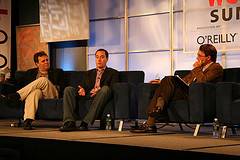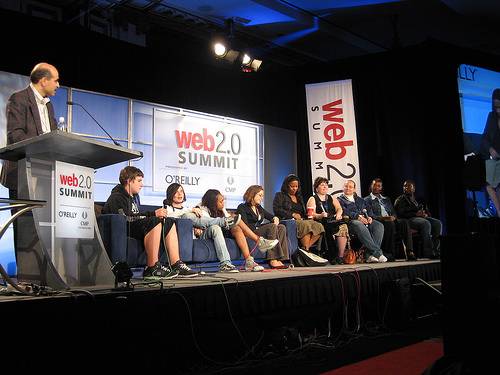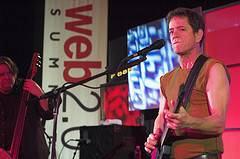Read/WriteWeb’s Web 2.0 Summit coverage sponsored by Yahoo!

It’s the end of a hectic week of conference-going for your R/WW correspondent – and so
time for a wrap-up of my thoughts on the Web 2.0
Summit. Firstly, my overriding feeling is that this year’s conference was a lot
different from last year’s. It was still a great conference, but in a different
way – perhaps reflected in the name change to Summit (a more business-sounding title).
Last year there were a lot more developers and designers running around, this year the
crowd was overwhelmingly from the media and business worlds. No doubt because of this, I
also felt this year’s conference lacked in cutting edge new products – and I didn’t learn
many new insights about Web technology. Having said that, it was still a very enjoyable
conference – O’Reilly Media and CMP put on a great show. There was plenty of schmoozing
in the hallways and lots of excellent discussions.
Why was 2006 different to 2005?
As
others have pointed out, the Summit had an ‘exclusive’ feel to it due to the $3k price
tag and business focus – and this meant a lot of the development and design innovators in
the Web world were not present. The reason why the developer/designer set has been
crowded out of this conference reflects the fact that, over the last year, traditional
media companies (e.g. EMI, Fox Interactive, the TV networks) have entered the Web 2.0 world
in a big way. That is a trend that will only intensify over the coming year, as web
innovation becomes mainstream. Also more traditional big tech companies are doing ‘web
2.0’ things – e.g. Intel released an enterprise suite at the Summit and companies like
IBM and Symantic were in attendance. These trends are inevitable – and welcome. Because
how else will little web 2.0 startups be ultimately successful, unless they’re embraced
by the mass market that big companies (or VC money) can bring them?

I do feel sad though that the developers and designers aren’t as much a part of the
Web 2.0 Summit (nee Conference) any more – but perhaps this is where the Web 2.0 Expo
will come in, the new sister conference being held in April 2007. I certainly hope so,
because finding out about new web technologies and trends is what I love the best.
The Best of the conference
To be purely selfish, undoubtedly my personal highlight was seeing Lou Reed play live
(courtesy of AOL). I’ve read some cynical reports about the 20-minute set he played –
that he was surly to the crowd and ironic etc. But isn’t that what you always get from a
Lou Reed show? I thought his set was great and he’s a legend to me – ’nuff said! 🙂
But onto actual Web stuff… highlights included:
- Jeff Bezos, who spoke on day 1, was especially interesting – talking about Amazon’s
WebOS initiatives. This is a topic that Read/WriteWeb has covered extensively and
hearing Bezos describe the background and strategy around this was fascinating. I
would’ve liked to hear a bit more about their future plans, but then that’s something
R/WW will dig into for you! 😉 - The desktop/Web integration theme was hot this year – with Adobe and Laszlo both in
attendance. I will explore both technologies in future posts. Also Zimbra
announced an offline mode for their web office suite. As Scott Karp nicely put it
to me later, the offline technologies we’re seeing are very reflective of this
transitional online/offline period of the Web. Broadband is not ubiquitous yet
(ironically demonstrated by the poor WiFi at the Summit venue!), so that’s why we’re
seeing all these offline solutions. - Mary Meeker’s The State
of the Internet, Part 3. It was another 10-minute quickfire powerpoint show by
Meeker, with data points hitting the stunned audience like machine gun bullets. But it’s
great data and I will be delving into the powerpoint when I get a chance! - A Conversation
with Ray Ozzie – although Ozzie didn’t reveal anything new, he’s a person who
commands a great deal of respect and so is a worthy successor to Bill Gates in terms of vision
and strategy. I also enjoyed hearing the counterpoint “office is dead” view from Steve Gillmor in the press room afterwards. - The panel
featuring 5 teenagers and 5 parents talking about what they use on the Web was
interesting, if a little awkward at times. What would be great is if some of the Web
research or analytics firms did bigger studies of this – and released it to the blog
world. Then we’d have some substantive data to build on and analyze. It is certainly
important to know what ‘real world’ people use on the Web, so I viewed this panel as just
a taster for the kind of data we’re crying out for.

The disappointments
- The Web 2.0
Summit Launchpad fell a little flat, in my opinion. There were some innovative
products there (e.g. 3B, Omnidrive, Sharpcast), but some of the others seemed a little
derivative. I don’t mean to dismiss their potential, as no doubt some will make great
businesses. And I admire anyone who goes out and does a web startup, so I wish all of
them the best with their products. But I really wanted to see the next Zimbra, or the
next JotSpot, or the next big thing. I don’t think we saw that. I’d be interested
in your opinions on this (feel free to comment). - I didn’t come away from the conference having learned much – even though I enjoyed
the conference overall. - The intent to have more international voices was great, but there still seems to be a
cultural disconnect. Liz Gannes at Gigaom called the international speakers (and other people outside of the inner tech circles) “cultural exhibits”. Personally I think the right intent is there from the conference
organizers to make the event more international, so hopefully next year there will be
more innovative companies from outside the Valley – both speaking and showing their
products. There’s a lot going on outside the valley in terms of innovation, as R/WW’s International
Web Apps series has proven. - Also disappointing was that I couldn’t respond to all the email requests I got to
check out new products, and meet all the people I wanted to! 🙁
Summary
Overall, I
have to say I enjoyed the conference. Last year in my wrap-up I probably came across as a
little too enthusiastic – even though I called last year’s post Cautious Optimism and
Cynical Buzz. This year I wasn’t as excited, but the conference was just as busy and
maybe a little more ‘mature’ in terms of where the industry is headed. So my feeling
coming away from the conference is that it was a great crowd of people there and the web
industry is still alive and thriving. Are we in a bubble? Absolutely, so the cautious
optimism and cynical buzz remains.

Some folks, like Ben
Metcalfe, think the conference has lost its edge. Maybe it has, but the Web 2.0
Summit is a different beast now than it was last year – and that’s a sign of the times.
Or to put it another way, so Lou Reed does corporate gigs now… hey, it’s still great
music! 😉
Pics: Dave Forrest, RJ,
Dave McClure
Poll
Tell us what you think in terms of what you learned from the Summit – either if you
were lucky enough to be there, or from the reports filed by me and other blogs/sites. Let
us know in the following poll. Plus comments (as always) are welcome.

















